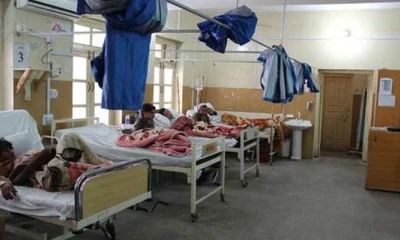Health
What are Vitamin D deficiency symptoms?
Vitamin D is essential for human well-being. Unlike other vitamins, vitamin D behaves more like a hormone. All the cells in the human body have a receptor for this essential nutrient.

It is well known that Vitamin D is manufactured from cholesterol within our blood when we are exposed to sunlight. However, modern lifestyles are detrimental to Vitamin D production, as most people work indoors during daylight hours.
Vitamin D deficiency can lead to a severe outcome, therefore it is essential to know what are the signs and symptoms of depleting sources. The recommended daily intake (RDI) is usually around 400–800 IU, but many experts say you should get even more than that.
Vitamin D deficiency is very common. It’s estimated that about 1 billion people worldwide have low levels of the vitamin in their blood.
Here are 7 common risk factors for vitamin D deficiency:
Having dark skin.
Being elderly.
Being overweight or obese.
Not eating much fish or dairy.
Living far from the equator where there is little sun year-round.
Always using sunscreen when going out.
Staying indoors.
What are the common signs and symptoms of Vitamin D deficiency? The most common ones are listed ahead.
1. Getting ill more often than is normal
Vitamin D keeps the immune system strong. Once there is a deficiency, the immune system becomes weaker, leading to more infections and more illnesses.
2. Fatigue
Being fatigued and feeling tired can have many probable causes. Vitamin D deficiency is one of them. Multiple studies have shown that having low levels of Vitamin D in the blood can lead to severe fatigue and constant tiredness.
3. Back pain and bone aches
Vitamin D is essential to improve the absorption of Calcium in our body. This is just one of how this nutrient helps our bones regenerating and remaining strong.
4. Depression
Elderly people are found to be more susceptible to depression caused by severe Vitamin D deficiencies. In one study, 65% of cases were found to have a link between depression and low blood levels of Vitamin D.
5. Delayed healing
Delayed or slow healing of wounds after an injury or incisions after surgery may be a sign of depleted Vitamin D in the patient’s body. Healing can be adversely affected by depleted sources in the blood.
6. Hair loss
Hair loss is commonly linked to iron deficiency or zinc deficiency. However, if the hair loss has no other explanation, Vitamin D deficiency may be to blame.
-

 Pakistan 12 hours ago
Pakistan 12 hours agoSaudi Arabia nothing to do with Imran Khan’s ouster: PM’s aide
-

 Pakistan 1 day ago
Pakistan 1 day agoJoint session of Parliament: Zardari's address, opposition protests
-

 Sports 23 hours ago
Sports 23 hours agoVideo goes viral of meeting Babar Azam, Shaheen Afridi
-

 Pakistan 2 days ago
Pakistan 2 days agoNawaz Sharif gets clean chit in Tosha Khana vehicles reference
-

 Pakistan 1 day ago
Pakistan 1 day agoUse of plastic bags banned across Punjab
-

 World 1 day ago
World 1 day ago10 including army chief killed in Kenyan helicopter crash
-

 Sports 1 day ago
Sports 1 day agoBabar Azam wonders amid differences with Shaheen Afridi
-

 Regional 2 days ago
Regional 2 days agoAmazon is filled with garbage ebooks. Here’s how they get made.































